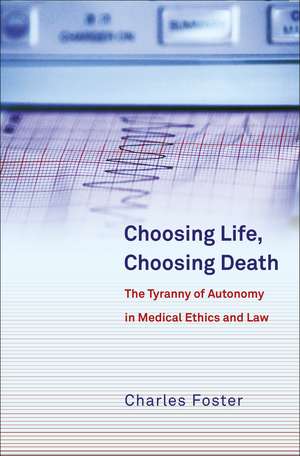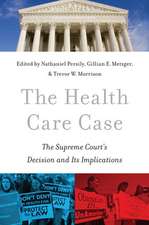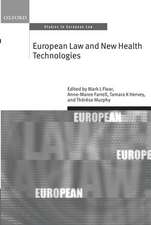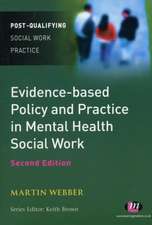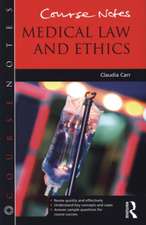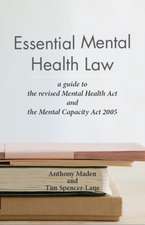Choosing Life, Choosing Death: The Tyranny of Autonomy in Medical Ethics and Law
Autor Charles Fosteren Limba Engleză Paperback – 26 feb 2009
Preț: 262.97 lei
Preț vechi: 339.09 lei
-22% Nou
Puncte Express: 394
Preț estimativ în valută:
50.32€ • 54.83$ • 42.40£
50.32€ • 54.83$ • 42.40£
Carte tipărită la comandă
Livrare economică 23 aprilie-07 mai
Preluare comenzi: 021 569.72.76
Specificații
ISBN-13: 9781841139296
ISBN-10: 1841139297
Pagini: 200
Dimensiuni: 156 x 234 x 10 mm
Greutate: 0.31 kg
Ediția:New.
Editura: Bloomsbury Publishing
Colecția Hart Publishing
Locul publicării:London, United Kingdom
ISBN-10: 1841139297
Pagini: 200
Dimensiuni: 156 x 234 x 10 mm
Greutate: 0.31 kg
Ediția:New.
Editura: Bloomsbury Publishing
Colecția Hart Publishing
Locul publicării:London, United Kingdom
Caracteristici
Autonomy is a vital principle in medical law and ethics which occupies a prominent place in all medico-legal and ethical debate. But there is a dangerous presumption that it should have the only vote, or at least the casting vote. This book is an assault on that presumption, and an audit of autonomy's extraordinary status.
Notă biografică
Charles Foster is a Barrister at Outer Temple Chambers, London, and teaches medical law and ethics at the University of Oxford. He is the author, editor or a contributor to many books and hundreds of other publications: www.charlesfoster.co.uk
Cuprins
Part 1: PrinciplesChapter 1: Autonomy: Challenging the Consensus Chapter 2: Other Contenders for a Voice Non-maleficence: Primum Non Nocere: Above All, Do No harm Beneficence Justice Professional Integrity Rights and Duties Chapter 3: Whose Autonomy? Part 2: Before LifeChapter 4: Reproductive Autonomy Should One Be Required to Reproduce? Should You Be Entitled to Have a Child? Applications to Adopt Applications by Prisoners Chapter 5: Abortion Chapter 6: Questions Raised by Reproductive Technology Part 3: Between Birth and DeathChapter 7: Confidentiality What Principles Are Embodied in the Law of Confidentiality? From Principle to Practice: Egdell, Genetic Counselling and Axon W v Egdell Genetic Counselling The Sue Axon Case Chapter 8: The Law of Consent Duty to Prevent Suicide: Reeves v Commissioner of Police for the Metropolis Autonomy Over One's Genitalia? R v Brown and Others The Caesarean Section Cases What Do We Mean When We Say 'I Want . . .'? What is 'Relevant Information'? Patient Responsibility The Limits of Consent Incidental Findings on Operation Consent, Biobanks and the Effect of Analysing Consent Questions in ECHR Terms The Notion of Capacity Best Interests and Incompetent Adults Children Chapter 9: Litigation, Rights and Duties Chapter 10: Medical Research on Humans Chapter 11: The End of Life Part 4: After DeathChapter 12: Transplantation Xenotransplantation Live Donor Homotransplantation Post-Mortem Homotransplantation Chapter 13: The Ownership of Body Parts Tissue From the Living Tissue From the Living and the Dead Existing Holdings Who Can Give Consent? Chapter 14: Epilogue
Recenzii
...written in a very powerful and thought-provoking style and will be an intriguing read for anyone interested in understanding the wide range of concrete cases that Foster considers....if read open-mindedly and with a view to understanding the main principles used in biomedical contexts, Foster's book has the potential to make a distinctive contribution to the debate about the role of autonomy...he has undeniably produced a book that will inject some life into the often stale academic debates on the topic.
...fresh, clear and eminently readable...This is a short book, passionately argued, which all those interested in medical law, and the rights and duties of patients and doctors, should read. You may disagree: you won't be bored.
This is certainly a useful book for people wishing to understand some of the legal background in key areas of medical law...it is also worthy of consideration in its own right by anyone seeking an alternative perspective on autonomy in health care ethics.
This book provides an accessible critique of the principle of 'autonomy' in the context of medical law. As a lawyer himself, Charles Foster succinctly summarises the various legal issues arising, as the title suggests, from conception to death.
This book is an important challenge to the dominance of autonomy in medical ethics and law ... [it] will ... be a useful and thought-provoking resource for those studying or teaching medical law and ethics.
This is an important addition to the ongoing ethical, as well as medico-legal debate regarding autonomy. Foster's work provides an excellent point of departure for those new to the area, as well as a rich source of reference material for subsequent investigations.
Are you a hirsute medical lawyer, with a low blood pressure and writer's block? Then this is the book for you. You will not have to read too many pages before your blood will be boiling, you will be pulling out your hair, and grabbing your keyboard to type a furious riposte. .. This book is a powerful challenge to the role that autonomy plays in medical law and ethics.The book demonstrates a wide-ranging understanding of the law. Few authors could hope to make as many sharp points as Foster does in such a short space of time.This must be the most fast-paced and easy-to-read book on the topic. For that reason it may well be of interest to students and no doubt lecturers will enjoy setting their chapters for students to read in order to provoke a response. Therein lies the strength of this book. It is a book that demands a reaction.
Charles Foster's book provides a welcome addition to the literature by confronting some of these premises in the context of English medical law.
Charles Foster minces no words. Choosing Life, Choosing Death is a comprehensive and passionately argued attack against the "tyranny of autonomy" in medical ethics and law.
...fresh, clear and eminently readable...This is a short book, passionately argued, which all those interested in medical law, and the rights and duties of patients and doctors, should read. You may disagree: you won't be bored.
This is certainly a useful book for people wishing to understand some of the legal background in key areas of medical law...it is also worthy of consideration in its own right by anyone seeking an alternative perspective on autonomy in health care ethics.
This book provides an accessible critique of the principle of 'autonomy' in the context of medical law. As a lawyer himself, Charles Foster succinctly summarises the various legal issues arising, as the title suggests, from conception to death.
This book is an important challenge to the dominance of autonomy in medical ethics and law ... [it] will ... be a useful and thought-provoking resource for those studying or teaching medical law and ethics.
This is an important addition to the ongoing ethical, as well as medico-legal debate regarding autonomy. Foster's work provides an excellent point of departure for those new to the area, as well as a rich source of reference material for subsequent investigations.
Are you a hirsute medical lawyer, with a low blood pressure and writer's block? Then this is the book for you. You will not have to read too many pages before your blood will be boiling, you will be pulling out your hair, and grabbing your keyboard to type a furious riposte. .. This book is a powerful challenge to the role that autonomy plays in medical law and ethics.The book demonstrates a wide-ranging understanding of the law. Few authors could hope to make as many sharp points as Foster does in such a short space of time.This must be the most fast-paced and easy-to-read book on the topic. For that reason it may well be of interest to students and no doubt lecturers will enjoy setting their chapters for students to read in order to provoke a response. Therein lies the strength of this book. It is a book that demands a reaction.
Charles Foster's book provides a welcome addition to the literature by confronting some of these premises in the context of English medical law.
Charles Foster minces no words. Choosing Life, Choosing Death is a comprehensive and passionately argued attack against the "tyranny of autonomy" in medical ethics and law.
Descriere
This book surveys the main issues in medical law to assault the status of autonomy and suggest how other principles should contribute to the law.
